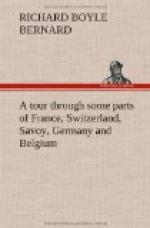This is the third year here, as well as in Burgundy and other districts, since there has been a favourable vintage; and it is only by mixing some of the vintage of 1811, with that of the subsequent years, that the inhabitants can dispose of a small portion of this inferior produce.
Boppart was the former residence of the electors of Treves, but the Palace is now falling to decay. Whilst contemplating this mouldering pile, I was struck with the well-known sounds of our national air, ’God save the King,’ which some of the company below sang in chorus (being probably tired of the politics of the Frenchmen, as much as I was), this air being originally German. The evening was fine for the season, and about sun-set, several of the distant hills presented a fine appearance, having bonfires ou their tops, this being the 18th of October, which will be long celebrated in commemoration of the decisive battle of Leipzig. Most of the company came on deck to witness the effect of the bonfires. The Germans seemed delighted at the sight which the Frenchmen surveyed in silence. One of them, however, soon recovering his loquacity, asked me if I had been at Paris, which he said was the greatest city in the world, and larger than London.
This I could not assent to, being contrary to fact. Yet it would he difficult for French ingenuity to prove what benefits result to a country from an overgrown capital. Superiority is, however, all they contend for. We soon saw the singular building (in an island) called the Palatinate; it is now used as a public granary, and was illuminated in honour of the day, as was also the neat village of St. Goar, where we passed the night. All seemed to partake of the festivity, and I could net discern in the inhabitants any symptoms of regret that they were no longer subject to France.
Having set out at an early hour, we reached Coblentz to breakfast. It is a large town, containing 12,000 inhabitants, and is advantageously situated at the confluence of the Moselle and Rhine. It was garrisoned chiefly by the Royal Guards of Saxony, who exceeded in appearance any troops I had seen on the Continent. Some of them are stationed in the ci-devant palace, which is situated close to the river.
The lofty mountain opposite the town is covered with the ruins of Ehrenbreitstein, which was at one time considered as the strongest fortress on the Rhine. Opposite the town was a bridge of boats, but it was destroyed in the last war, and a flying bridge is substituted pro tempore. The Rhine is so rapid near Andernach, as never to freeze in the severest winter, and it here proceeds longer in a straight course, than I had yet seen in any part. Neuwied, although subject to inundations, is a large well built and commercial town. Lower down, on the left bank of the river, I observed an obelisk, which I found, on inquiry, was erected to the French General Marsan, who fell during the period of the first invasion of Germany by the French republicans. Still farther, and close to the river, stands an ancient building, called The Devil’s House, but, from what circumstance, I could not exactly discover. Some attribute it to the vast number of windows which it contains.




